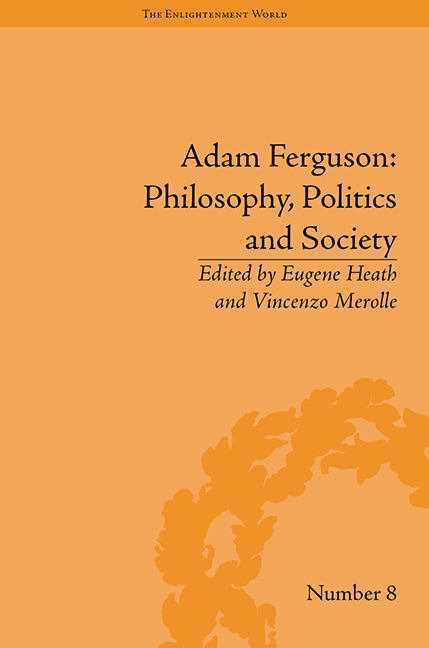6 - A Complicated Vision: The Good Polity in Adam Ferguson's Thought
from III - Politics
Summary
It is a commonplace observation that Adam Ferguson's social and political thought seems troubled by many conflicts. It has even been suggested that his body of work lacks system. Certainly, his corpus is diverse and complex, replete with ambivalence, tension and even paradox. This essay seeks to build a picture of Ferguson's conception of the good polity and to explore the tensions that lie within it. Despite some puzzling exceptions, these tensions are, in fact, reconcilable once they are understood in relation to his social science, his historiography and his attempts to forge a new approach to politics that could be described as ‘liberal-Stoicism’. The discussion begins by canvassing some of the complications and underlying assumptions of Ferguson's political thought.
The Background to Ferguson's Political Thought
Ferguson makes for demanding reading partly because of his somewhat disorderly style of writing and partly because of his ambivalent attitude to many political issues. It is not so much that his thought lacks system as it is that the system that exists must be carefully culled by the reader. Yet, Ferguson leaves no doubt that politics is important, not only because it is highly consequential, but because humans are other-regarding creatures of action and conflict and politics is the ideal forum for the exercise of this special nature. Ferguson agrees with Aristotle that it is language that makes us both fit and destined for life in a polity. Since humankind alone is capable of speech it is the only species destined for political life.
Ferguson's turn of mind is, in many ways, moralistic and romantic, yet his politics seems to have been shaped and constrained by a strong desire to be practical and grounded. Normative moralizing has its place but one should not moralize simply to defend an abstract principle; after all, the point of all systems and institutions is to make people happy.
- Type
- Chapter
- Information
- Adam FergusonPhilosophy, Politics and Society, pp. 107 - 124Publisher: Pickering & ChattoFirst published in: 2014



